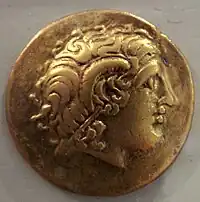The Belaci were a small Gallic tribe dwelling in the Alpes Cottiae, around present-day Oulx, during the Iron Age.
Name
They are mentioned as Belacorum on the Arch of Susa.[1][2]
The ethnonym Belaci is possibly Celtic, stemming from the root belo- ('strong') extended by the suffix -aco-. Variants beginning with V- may also occur in inscriptions, as in Vellaconis, Velaci, Velaco, Velagenius, Vilagenio, Vilagenia, Velagenus, or Velacena.[3][2]
The toponym Beaulard, located in their territory, derives from an earlier Belas.[4]
Geography
The Belaci dwelled around the settlements of Ad Martis (modern Oulx) and Diovia (Bardonecchia).[4][5] Their territory was located north of the Segovii, south of the Medulli, west of the Segusini, and east of the Graioceli.[5]
Their chief town, Ad Martis, was situated on the road crossing through the Alpes Cottiae above Segusio, at the confluence of the Dora di Bardonecchia and the Dora Riparia. It derives its name from a cult site dedicated to the Roman god Mars, ad (fanum) Martis.[6] The settlement of Ad Fines (modern Fenils) may have served as the border between the territories of the Segovii and Belaci.[4]
History
They are mentioned on the Arch of Susa, erected by Cottius in 9–8 BC.[7]
References
- ↑ CIL 5:7231.
- 1 2 Falileyev 2010, s.v. Belaci.
- ↑ Barruol 1969, pp. 334–335.
- 1 2 3 Prieur 1968, p. 77.
- 1 2 Talbert 2000, Map 17: Lugdunum.
- ↑ Uggeri 2006.
- ↑ Barruol 1969, p. 32.
Bibliography
- Barruol, Guy (1969). Les Peuples préromains du Sud-Est de la Gaule: étude de géographie historique. E. de Boccard. OCLC 3279201.
- Falileyev, Alexander (2010). Dictionary of Continental Celtic Place-names: A Celtic Companion to the Barrington Atlas of the Greek and Roman World. CMCS. ISBN 978-0955718236.
- Prieur, Jean (1968). La province romaine des Alpes Cottiennes. Impr. R. Gauthier. OCLC 834310867.
- Talbert, Richard J. A. (2000). Barrington Atlas of the Greek and Roman World. Princeton University Press. ISBN 978-0691031699.
- Uggeri, Giovanni (2006). "Martis, ad". Brill's New Pauly. doi:10.1163/1574-9347_bnp_e725410.
